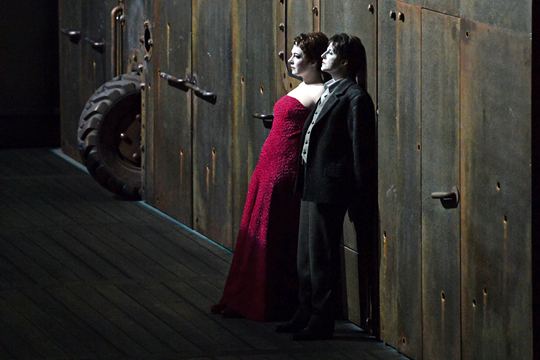
Our Own Ercole Farnese demonstrated that his brain is as well-developed as his trapezoids by guessing, quickly and accurately, that last week’s Regie Quiz depicted Rienzi.
Our own Ercole Farnese has alerted La Cieca to a breaking story in Il Secolo XIX: Dessì diserta Genova per amore.
Soprano Mirella Freni is under investigation by the Bologna District Attorney’s office of Bologna for money laundering and exportation of money abroad in connection with the BER bank. The artist from Modena, 76, will be heard by the magistrates in the next few days to clarify her position, now that the DA Antonella Scandellari has…
Cubes and Macbeth seem to have been a successful pairing in the recent Regietheater. Graham Vick’s production of Macbeth at the Teatro alla Scala in the 1997/98 season had become famous, or infamous, for centering its spirit and energies on a big cube dominating both sets and singers. David Pountney exploited the same idea of…
La Cieca is simply overjoyed to announce a handy and fascinating innovation at parterre.com: The Author Archive Page. Each of your doyenne’s stable of scribes will be assigned his and/or her own unique page where every story under that byline will be easily accessible—as, for example, the many and wondrous reviews of Ercole Farnese. Look…
“Le pene d’amore non uccisero la Callas” reads the rather sensational headline: “The pains of love did not kill Callas.” The actual story in La Stampa is more sober, telling of an investigative study into the causes of the diva’s vocal decline and eventual death.
Our Own Ercole Farnese discovered and translated this interview in La Stampa with Jonas Kaufmann, in which the tenor discusses his “his idolatrous success with ladies and gay men, four fifths of the opera-goers.”
There is no peace for Verdi in Parma. As a second production of its Verdi Festival the Teatro Regio presented I vespri siciliani on October 10, starring Giacomo Prestia as Procida, Leo Nucci as Monforte, and the lovebirds Daniela Dessì and Fabio Armiliato as Elena and Arrigo.
1817 was a fertile and diverse time for 26 year old Gioachino Rossini. It opened with his last true opera buffa, La Cenerentola, continued with his most important semiseria, La gazza ladra, and ended with two operas, which, although both nominally belonging to the seria genre, could not be more different from each other.
Although she has made headlines on this side of the Atlantic largely because of her recent dismissal by Franco Zeffirelli from a Roman production of La traviata on the grounds of “physical inadequacy,” Daniela Dessì is a topflight star in Europe. In her native Italy she is arguably the most popular soprano currently active. Over…
Rome, June 16, 1800. Emilia sits in the lodge of Palazzo Farnese, of which she is the doorkeeper. She is a resilient, strong-willed and somewhat hardened woman. After all, she has long been in the employ of the Palazzo’s formidable occupant, Baron Scarpia, and witness to so much of his wickedness.
One week after my visit to Amore Opera, it was time to turn my attention to Bleecker Street Opera — another heir presumptive to the throne of the defunct Amato Opera.
A recent production of Il Trittico, recorded in Modena, was originally published on DVD by TDK two years ago. However, its new release on Blu-ray — along with the attention this Puccini masterpiece has received thanks to a handful of recent high-profile productions — has prompted me to take another look. Although this video was…
My latest assignment from our doyenne has been to explore two of the many small opera companies pullulating around New York City. Some of these ensembles last l’espace d’un matin, while others have been enjoying a longer, healthier life.
With Händel’s canon largely rediscovered and audiences hungry for more music from the Baroque period, opera houses and recording companies have increasingly turned their attention towards the stage works of Antonio Vivaldi. In only the past decade around 25 of Vivaldi’s operas and pasticcios have been revived, and more and more artists are performing and…
“Voglio essere giudicato per la musica e nient’altro che per la musica.” “I want to be judged for my music and nothing but my music.” This phrase, which Mascagni himself wrote to his publisher Sonzogno, is the key to understanding the very essence and existence of L’amico Fritz (1891). Cavalleria rusticana, Mascagni’s first performed opera,…
La Cieca welcomes to the editorial desk of parterre.com new correspondents squirrel and Ercole Farnese, who have already begun their blanket coverage of the New York City opera scene.




